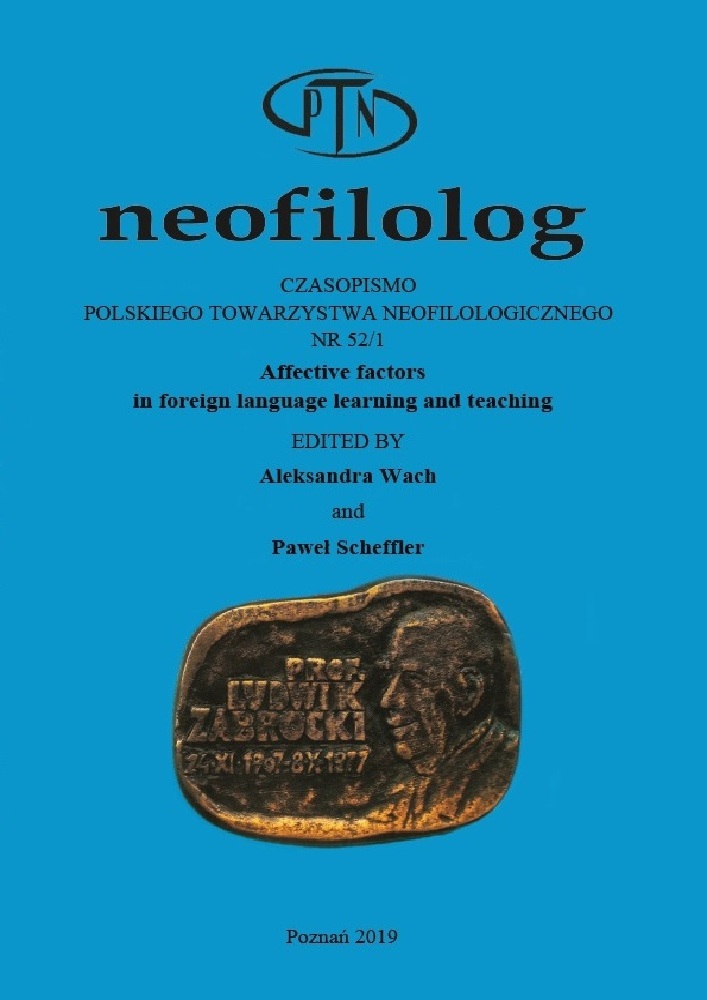Abstrakt
As language teachers, we have to pay attention to many things in our work but cognitive aspects of foreign or second language learning cannot provide all the information we need. If we also give attention to the affective domain, this can make our teaching more effective. In this article we will be considering some of the affective factors and exploring how they influence the process of language learning. Special emphasis will be placed on implications for teachers in the classroom.
Bibliografia
Arnold J. (2011), Attention to affect in language learning (in) “Anglistik. International Journal of English Studies”, No 22/1, pp. 11-22.
Council of Europe. (2001), Common European Framework of Reference for Languages: Learning, Teaching, Assessment. doi: https://rm.coe.int/16802fc1bf
Ellis K. (2004), The impact of perceived teacher confirmation on receiver apprehension, motivation and learning (in) “Communication Education”, No 55/1, pp. 1-20.
Jensen E. (1998), Teaching with the brain in mind. Arlington, VA: ASCD.
León I. (2005), La confirmación del profesor de inglés percibida por el alumnado en educación secundaria. Unpublished MA thesis: Universidad de Sevilla, Seville.
North B., Piccardo E. (2016), Developing illustrative descriptors of aspects of mediation for the Common European Framework of Reference (CEFR). A Council of Europe project (in) “Language Teaching”, No 49/3, pp. 455-459.
Palmer P. (1998), The courage to teach. San Francisco: Jossey-Bass Publishers.
Stern H. H. (1983), Fundamental concepts of language teaching. Oxford: Oxford University Press.
Stevick E. W. (1980), Language teaching: A way and ways. Rowley, MA: Newbury House.
Rodríguez J., Plax T., Kearney P. (1996), Clarifying the relationship between teacher nonverbal immediacy and student cognitive learning: affective learning as the central causal mediator (in) “Communication Education”, No 45, pp. 294-305.
Underhill A. (1999), Facilitation in language teaching (in) Arnold J. (ed.), Affect in Language Learning. Cambridge: Cambridge University Press.
Licencja
Prawa autorskie (c) 2019 Jane Arnold

Utwór dostępny jest na licencji Creative Commons Uznanie autorstwa – Bez utworów zależnych 4.0 Międzynarodowe.
Przedstawiany utwór (artykuł) upubliczniany jest na podstawie umowy z autorem i na licencji Creative Commons Attribution-NoDerivatives 4.0 International (CC BY-ND 4.0).
Użytkownicy mają obowiązek podania wraz z rozpowszechnionym utworem, informacji o autorstwie, tytule, źródle (odnośniki do oryginalnego utworu, DOI) oraz samej licencji;
- bez tworzenia utworów zależnych,
- utwór musi być zachowany w oryginalnej postaci.
Uniwersytet im. Adama Mickiewicza w Poznaniu zachowuje prawo do czasopisma jako całości (układ, forma graficzna, tytuł, projekt okładki, logo itp.).

